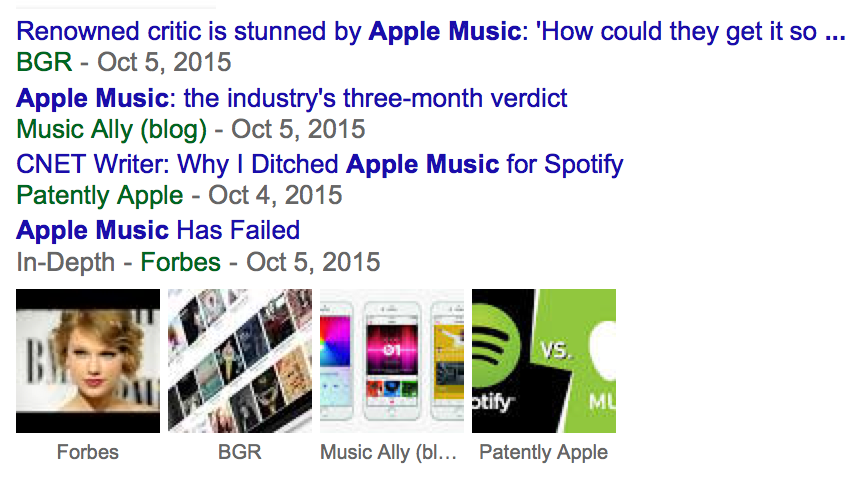Yesterday’s post discussed how a raft of news articles, Google search trends, and some market research all pointed to widespread disaffection with Apple Music. Those examples and data pointed to challenges Apple Music is having establishing market share for streaming music subscribers. However, the service may be facing an even bigger challenge in establishing favorable mindshare among consumers. So what do people think about Apple Music? Or are they even thinking about it?
It’s Fashionable to Hate Apple Music
 It is now fashionable to disparage Apple Music. Any Google search is sure to turn up results ranging from criticism to animosity. “Apple Music Has Failed” – Forbes. “Why I ditched Apple Music for Spotify” – Cnet. “Renowned Music Critic is Stunned by Apple Music: ‘How could they get it so wrong?’” – BGR. Here is the blog rant by the renowned music critic. And here is another headline from an influential blogger and podcaster in the Apple community, Jim Dalrymple, “Apple Music is a Nightmare and I’m Done with It” – The Loop. “Apple Music is a mess, and it’s alienating the company’s biggest fans.” – Business Insider.
It is now fashionable to disparage Apple Music. Any Google search is sure to turn up results ranging from criticism to animosity. “Apple Music Has Failed” – Forbes. “Why I ditched Apple Music for Spotify” – Cnet. “Renowned Music Critic is Stunned by Apple Music: ‘How could they get it so wrong?’” – BGR. Here is the blog rant by the renowned music critic. And here is another headline from an influential blogger and podcaster in the Apple community, Jim Dalrymple, “Apple Music is a Nightmare and I’m Done with It” – The Loop. “Apple Music is a mess, and it’s alienating the company’s biggest fans.” – Business Insider.
It is easier to critique something than support it. Apple Music was going for a broad user base and that makes it difficult to please everyone. The two fiercest complaints tend to boil down into either “it’s no better than Spotify” or “it ruined the iTunes experience and made it harder to listen to owned music and playlists.”
To be fair, there is also a positive result to the search, “I love Apple Music,” it yields an article “I love Apple Music and I’m willing to forgive its flaws.” Of course, half of the article discusses things the author doesn’t like. The bigger problem is that all of the other favorable articles on the first results page were written the week the service was launched. Does anyone still like Apple Music?
On the bottom of the second search results page, we find a more recent article from MacWorld where three of five Apple aficionados on staff at the magazine decided to switch to Apple Music while two stayed with their current services, Rdio and Spotify. The third search engine results page gives you two favorable links and the rest were unfavorable. This is not evidence of winning the hearts and minds of consumers considering Apple typically has hordes of cheerleaders.
Apple Music is Not Trending According to Google
Most of the Internet radio and streaming services are focused on user growth. The numbers that Apple Music reports on subscribers and ad-supported listeners will be closely watched if ever revealed. Even Apple has spoken about a goal to reach 100 million subscribers.
Another way to look at Apple Music’s current mindshare and traction among users is to look at Google searches and compare that to its biggest U.S. rivals. You can see in the chart below that Pandora (blue line) peaked in the six months prior to its 2011 IPO and in the 18 months following. It has slowly declined since that time with regular peaks each December.
By contrast, Google searches for Spotify (green line) have grown consistently since 2009 and are now slightly above Pandora. The relative Google search rank for each term is 58 Spotify, 57 Pandora, 10 Apple Music (yellow line) and 4 iHeartRadio (red line). Apple Music is about one-sixth as popular a search term as its more established rivals, but is outperforming iHeartRadio for the time being.
The Google trends chart we displayed in yesterday’s post was even less flattering. The search “Apple Music cancel” (red line) bested “Apple Music subscribe” by a ratio of 100:1. These results suggest Apple Music has a long way to go to break through clutter and establish strong consumer mindshare.
Fighting for a Sliver of the Market
Part of the challenge is that Apple Music must decide what it wants to be. The services has focused all of its messaging on the premium subscription service. Many consumers and even industry pundits don’t know there is a “free,” ad-supported option. XAPPmedia detailed how this service operates in our recent Apple Music Ad Load Report. So why isn’t Apple talking about its ad-supported solution? There is likely a fear that promoting the ad-supported solution could decrease the number of subscribers. There may also be a fear of promoting a service approach that music label executives like to demonize. The better question is why did Apple Music maintain an ad-supported service similar to iTunes Radio? Four reasons:
- Apple already had an ad-supported listening base from iTunes Radio that it didn’t want to abandon
- According to Nielsen 95% of consumers have chosen ad-supported listening
- Strategy Analytics forecasts that no more than 11% of Internet radio and streaming listeners will ever choose to subscribe
- Spotify has proven that the ad-supported freemium model is the most effective way to grow a large subscriber base
 Apple’s biggest challenge is that it is fighting hard over 5% of the market represented by subscribers and is ignoring 95% of the market that prefers a free service. Pandora pioneered delivery of a great ad-supported Internet radio experience and now claims about 80 million monthly listeners. Spotify has always had a big focus on subscriptions, but has an ad-supported audience of 55 million listeners that has served as a feeder into its paid subscriber base of another 20 million people. The lack of Apple focus on ad-supported listening is perplexing because it entered the Internet radio market in 2013 with an ad-supported service. iTunes Radio was free and didn’t offer a subscription option but little was done to improve the service or grow the audience. About six months after launch, the subscription-only Beats music streaming service was acquired and iTunes Radio languished as the new strategy was devised. Apple was targeting 95% of listeners, but abandoned the strategy to focus on the 5%. How different would the Apple Music launch have been if there were 20 or 30 million active users of iTunes Radio that could have served as a core audience for both ad-supported listening and ready converts to streaming subscription? Apple certainly would have been in a much better position to start delivering large checks to music labels and artists with this base to build upon. It also would have commanded much more favorable mindshare in the market of consumer opinions.
Apple’s biggest challenge is that it is fighting hard over 5% of the market represented by subscribers and is ignoring 95% of the market that prefers a free service. Pandora pioneered delivery of a great ad-supported Internet radio experience and now claims about 80 million monthly listeners. Spotify has always had a big focus on subscriptions, but has an ad-supported audience of 55 million listeners that has served as a feeder into its paid subscriber base of another 20 million people. The lack of Apple focus on ad-supported listening is perplexing because it entered the Internet radio market in 2013 with an ad-supported service. iTunes Radio was free and didn’t offer a subscription option but little was done to improve the service or grow the audience. About six months after launch, the subscription-only Beats music streaming service was acquired and iTunes Radio languished as the new strategy was devised. Apple was targeting 95% of listeners, but abandoned the strategy to focus on the 5%. How different would the Apple Music launch have been if there were 20 or 30 million active users of iTunes Radio that could have served as a core audience for both ad-supported listening and ready converts to streaming subscription? Apple certainly would have been in a much better position to start delivering large checks to music labels and artists with this base to build upon. It also would have commanded much more favorable mindshare in the market of consumer opinions.
What Apple Should Do Next
Apple seems to be held to a different standard. The service works, but not perfectly. Users simply expected flawless operation and something better than existing services. Based on the commentary trend line, Apple Music has fallen well short of expectations. The question is whether the company can follow Taylor Swift’s advice to Shake it Off and move forward despite the negative feedback. A good start will be to provide a great ad-supported freemium listening service. 95% of Internet radio listeners just might appreciate it. Apple Music’s Eddie Cue offered hope to Apple fans in a recent Evening Standard interview, “We’re pleased with the number of people who have tried. Everybody gets fixated on the short term but we’re in this for the long haul.”
Related Posts
Can Apple Music Shake Off the Haters? Pt. 1
New Apple Music Ad Load Report
Apple Accepts the Worst Deal in Music Streaming – thanks to Taylor Swift
